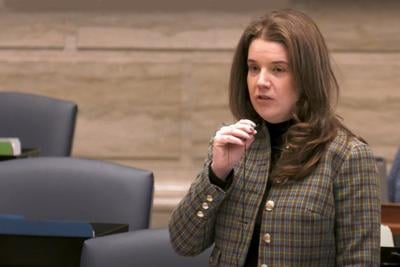
Sen. Mary Elizabeth Coleman, R-Arnold
JEFFERSON CITY — A conservative bloc of Republicans temporarily torpedoed a $70 million plan aimed at addressing the affordability of child care in Missouri.
Despite a push by GOP Gov. Mike Kehoe and the state’s powerful business lobby to boost the number of day care slots through a series of tax credits, opponents argued Tuesday night that taxpayers should not incentivize parents to spend time away from their children.
“People think we’re living in some kind of utopia where government can solve every problem,” said Sen. Mary Elizabeth Coleman, R-Arnold. “I don’t think we should be socializing this. I don’t think government should be taking over another industry.”
Sen. Jill Carter, R-Granby, said her husband worked two jobs while she stayed home to raise her children.
People are also reading…
And, Sen. Curtis Trent, R-Springfield, questioned why taxpayers should subsidize child care businesses when there is a high demand for their services.
The package, which was earlier approved by the House as part of an unfinished agenda item from former Gov. Mike Parson’s administration, was pulled from consideration after Coleman stalled action on the measure by reading “Little House on the Prairie” by Laura Ingalls Wilder.
The initiative could return for further debate before the Legislature is scheduled to adjourn next week, but its prospects remain in flux after a similar plan was rejected last year.
The proposal would add a tax credit allowing those who donate to child care providers to receive a credit equal to 75% of their donation and must not exceed $200,000 in annual tax credits.
Employers who help their workers with child care costs could claim tax credits equal to 30% of qualifying expenses.
A third tax credit would help child care providers expand or upgrade their facilities.
Sen. Sandy Crawford, R-Buffalo, who carried the bill on the Senate floor, said there are protections for taxpayers included in the legislation.
“All these projects have to be approved by the state,” Crawford said.
In one of his first acts after being sworn into office in January, Kehoe issued an executive order calling on state school officials “to improve the state regulatory environment for child care facilities and homes.”
The push to expand child care comes as business groups say Missouri’s economy loses an estimated $1.35 billion annually — including $280 million in lost tax revenue — because of a lack of affordable child care.
The pandemic also gutted the industry as people stayed home with their children while working remotely. The number of day care slots has taken a hit and rising prices have frustrated working parents.
Supporters say improving the state’s child care infrastructure is as important for economic growth as having roads and adequate utilities.
Coleman, a first-term senator who is not running for reelection, expressed disappointment that the Senate had earlier dropped consideration of a pro-gun rights bill to take up the tax credit proposal.
“This is absolutely insane to me,” Coleman said. “It’s really obscene. Here we are passing a child care tax credit?”
Among her complaints was language in the legislation she suggested could allow a piano teacher or an after-school tutor to claim the tax credit.
“It doesn’t seem clear to me at all,” Coleman said.
Coleman proposed an amendment that would provide tax credits to stay-at-home parents, saying they should benefit too. It died on a 10-18 vote and she announced she would work to kill the entire bill.
A similar child tax credit proposal received bipartisan support in the House in 2024 but also fell victim to Republican infighting in the Senate.
The legislation is Hous
When Florida state Rep. Fiona McFarland's infant daughter Grace crawled for the very first time, the mom of four was right next door, hard at work with her legislative policy staff in the state capitol. Thanks to the on-site child care available in the statehouse, McFarland didn't miss that magical first milestone in her 7-month-old's young life.
















